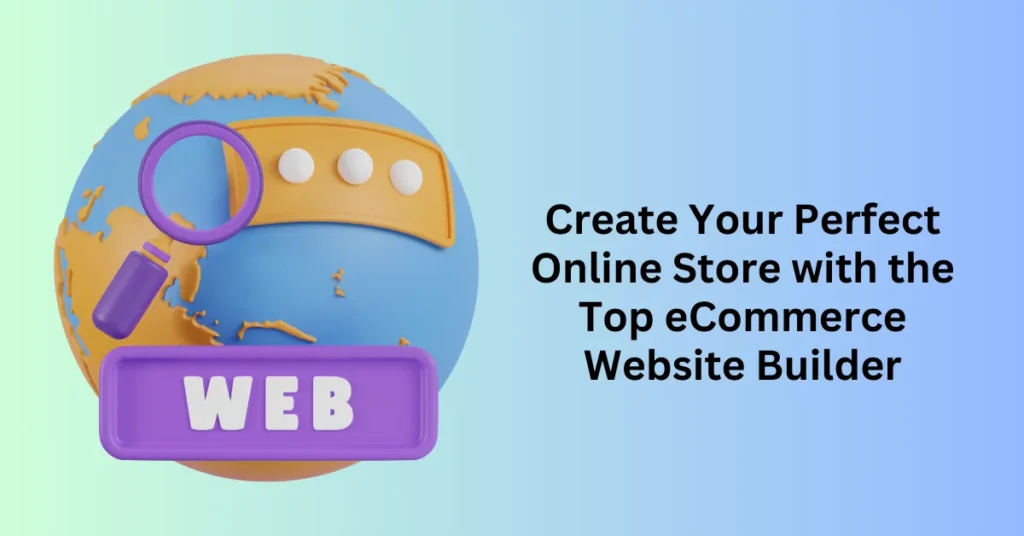In today’s digital world, having an online store is no longer a luxury—it’s an essential step for businesses aiming to thrive in a competitive marketplace. Whether you’re an ambitious entrepreneur with a groundbreaking product idea or a seasoned business owner ready to expand online, selecting the right eCommerce website builder tool can be a game-changer.
To simplify the process, an online store builder serves as a versatile platform that streamlines creating, customizing, and managing an eCommerce website. These platforms eliminate the technical barriers of web development, enabling anyone—even those without coding expertise—to design a professional online store with ease.
Regardless of what you’re selling—be it physical products, digital downloads, or services—a high-quality eCommerce website builder offers essential features to help you succeed. For instance, these platforms provide seamless inventory management, secure payment gateways, stunning templates, and robust marketing tools. Collectively, these features empower you to transform your vision into reality.
However, with so many options available, how do you choose the best builder for your business? More importantly, what should you look for in a platform to ensure it aligns with your goals and fosters growth?
In this guide, we’ll explore the key reasons to invest in an eCommerce website builder and outline the steps to create a store that truly stands out. Whether you’re starting from scratch or looking to upgrade your existing website, you’re just a few clicks away from building a store that reflects your brand and delights your customers.
So, let’s dive in and start building your dream online store today!
Why Building a Website is Crucial for Your Business Success
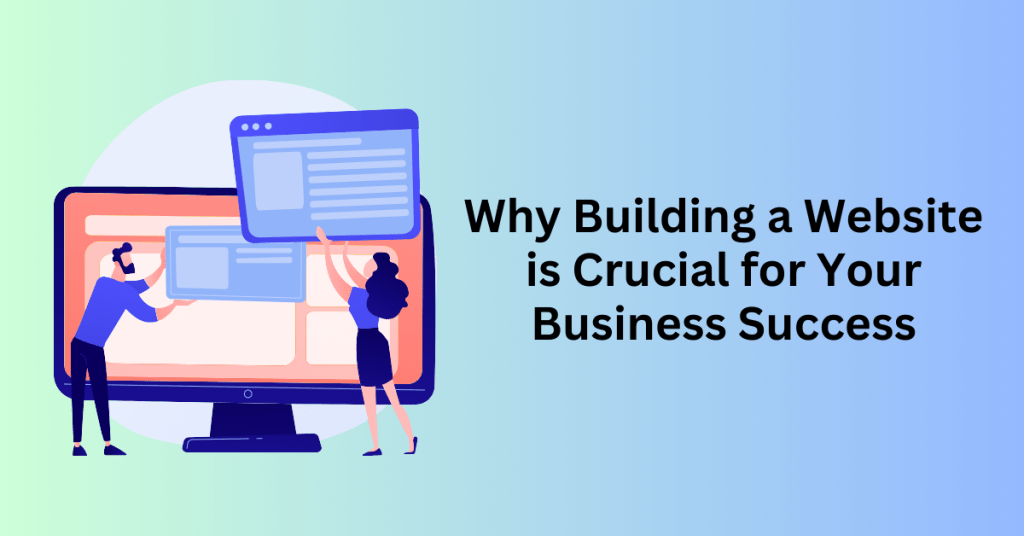
As we move further into 2024, the digital world continues to grow at an unprecedented pace. With over 1.1 billion websites globally, only about 194 million are actively maintained—a staggering 82% remain dormant. This opens a significant window of opportunity for businesses to carve out their unique space and establish a robust online presence. A website isn’t merely a digital placeholder; it’s the cornerstone of your brand’s identity, acting as your virtual storefront, marketing engine, and customer support hub all in one. Here’s why every business should prioritize building a professional website:
1. Expand Your Reach and Operate Beyond Boundaries
A website enables your business to transcend physical limitations. Whether you run a local shop or a global enterprise, having an online presence means you can serve customers across the globe 24/7. Through an eCommerce platform, you can seamlessly sell products or services, reaching audiences you never thought possible.
2. Establish Trust and Credibility
In today’s competitive landscape, trust has become a vital currency that drives success. A well-designed website, equipped with a custom domain, secure payment options, detailed product descriptions, and customer reviews, serves as a powerful signal of professionalism. These elements collectively work to build confidence in your brand. As a result, potential customers are much more likely to choose a business that presents itself as credible and reliable.
3. Streamline Online Sales and Operations
Modern eCommerce platforms make managing an online store simpler than ever. With tools for inventory tracking, smooth checkout experiences, and the ability to sell both physical and digital products, a website allows you to automate and optimize your sales process. This efficiency frees up your time to focus on other aspects of your business.
4. Accelerate Growth and Scale Your Business
A website serves as a dynamic platform to showcase your brand identity and unique offerings. With the right tools, you can attract, engage, and retain customers while scaling your operations. Features like email marketing, analytics, and CRM integration help your business evolve alongside your audience’s needs.
5. Enhance Visibility and Engagement
Search Engine Optimization (SEO) tools integrated into your website ensure that your business gets found by the right audience. Coupled with social media integration, you can drive traffic, boost engagement, and connect with customers where they spend their time online. A website acts as the hub that ties all your digital marketing efforts together.
In today’s digital-first world, not having a website is akin to closing your business to countless opportunities. Whether you aim to expand your reach, establish trust, or scale your operations, a website is the most powerful tool in your arsenal. By investing in a professional, user-friendly site, you position your business for growth, increased visibility, and long-term success. Make 2024 the year your business thrives online.
Step-by-Step Guide to Building a Successful Online Store
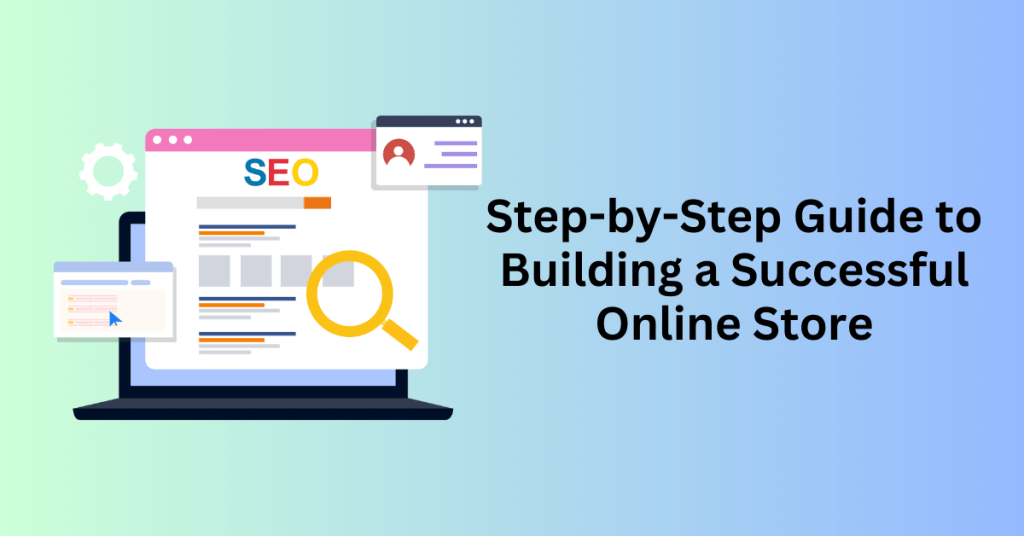
Creating an online store can transform your business, allowing you to reach customers worldwide and operate 24/7. Follow this step-by-step guide to set up a thriving eCommerce business.
Step 1: Choose the Right eCommerce Website Builder
Your choice of platform is the foundation of your online store’s success. Select an eCommerce website builder that aligns with your business goals. Here’s how some popular options compare:
| Feature | Bluehost WordPress Commerce Solution | Shopify | Wix |
| Scalability | High: Supports unlimited products and traffic | Moderate: May require higher-tier plans | Moderate: Limited customization for scaling |
| Plugin Integrations | Extensive: Includes WooCommerce plugins | Limited to Shopify ecosystem | Limited compared to WordPress |
| Affordability | Cost-effective all-in-one solution | Higher costs for advanced features | Affordable but lacks advanced eCommerce tools |
| Secure Payment Options | PayPal, Stripe, and more | Shopify Payments (fees apply) | PayPal and other basic options |
| Testing Environment | Included for safely testing changes | Not available | Not available |
Step 2: Set Up Your Online Store with the Right eCommerce Website Builder
Once you’ve selected your platform, the next step is to build the framework of your store. Begin by uploading clear, high-quality product images that effectively showcase your offerings. Pair these visuals with compelling product descriptions that highlight key benefits and features, which will attract potential buyers. Additionally, set competitive pricing for your products and organize them into categories, making it easier for customers to navigate your store.
Next, it’s essential to set up secure payment options using trusted gateways such as PayPal, Stripe, or other supported methods. Platforms like Bluehost streamline this process with built-in integrations, ensuring secure transactions for your customers. Moreover, inventory management tools should be implemented to monitor stock levels, prevent overselling, and maintain smooth operations.
When it comes to design, create a user-friendly layout that aligns with your brand identity. Use Bluehost’s customization tools to craft a visually appealing and unique storefront. Don’t forget to optimize your site for mobile users, as this ensures a seamless shopping experience across all devices, expanding your store’s reach to a wider audience.
Before launching your store, it’s crucial to conduct thorough testing to ensure everything functions smoothly. Bluehost offers a staging environment where you can make and test changes without affecting your live site. This feature allows you to refine your store until it meets your expectations, ensuring a polished and professional launch.
Step 3: Customize Your Website
Your eCommerce website should be a true reflection of your brand. Customization is crucial in creating a memorable shopping experience and fostering customer trust.
Start by selecting a theme that complements your brand’s aesthetic and aligns with your industry. Choose a responsive design to ensure your website looks appealing and functions seamlessly across desktops, tablets, and mobile devices. This adaptability not only enhances the user experience but also caters to a broader audience.
Next, take advantage of the drag-and-drop tools provided by your eCommerce site builder to design a layout that promotes smooth navigation. Highlight key elements, such as featured products, special offers, and bestsellers, to capture visitors’ attention and guide them toward making a purchase.
To make your site uniquely yours, incorporate your brand colours, fonts, and logo. This creates a cohesive visual identity that resonates with customers. Adding professional product images and high-quality visuals further captivates your audience and leaves a lasting impression. These details help communicate your brand’s values and professionalism effectively.
Additionally, invest in a custom domain (e.g., www.yourstore.com) to enhance your site’s professionalism. A custom domain not only strengthens brand recognition but also builds trust, making it easier for customers to find and identify your store online.
Ultimately, a thoughtfully designed eCommerce website boosts your brand’s credibility, encourages visitors to explore your offerings, and transforms them into loyal customers.
Step 4: Set Up Shipping and Taxes
Smooth shipping and tax management are essential for delivering an exceptional shopping experience. To streamline these processes effectively, follow these steps:
First, begin by configuring shipping rates that align with your business model. Options such as flat rates, free shipping, or rates based on weight and location can cater to a variety of customer needs. By using your platform’s shipping tools, you can automate these calculations, ensuring real-time accuracy and providing customers with precise shipping estimates during checkout.
Next, define your delivery zones by specifying the regions you serve and assigning the appropriate shipping methods to each zone. Additionally, partnering with reliable shipping providers will help ensure timely and efficient deliveries, which, in turn, boosts customer satisfaction and builds trust in your business.
When it comes to tax management, leverage the built-in tax tools offered by your eCommerce platform. These tools automatically calculate taxes based on the customer’s location, saving you time and reducing the risk of errors. It’s also important to stay informed about regional tax regulations to maintain compliance and ensure smooth operations.
By streamlining your shipping and tax processes, you create a hassle-free experience for both you and your customers. Ultimately, this not only enhances customer trust but also fosters loyalty, positioning your business for long-term success.
Step 5: Launch Your Store and Market It
Now that your online store is set up, it’s time to introduce it to the world. A well-planned launch combined with an effective marketing strategy will help you attract your target audience, generate sales, and establish your brand’s presence online.
1. Go Live: Start by publishing your website, ensuring everything is fully functional. Double-check navigation, product pages, the checkout process, and mobile responsiveness to deliver a seamless experience. Set a launch date to build anticipation and announce your store’s debut through social media and email newsletters.
2. Promote Your Store: To drive traffic and attract customers, implement targeted marketing strategies:
- Social Media Marketing
Share engaging posts about your products on platforms like Instagram, Facebook, Pinterest, and TikTok. Use paid ads to expand your reach, targeting specific demographics and interests to connect with potential customers. - Content Marketing
Start a blog on your website featuring helpful tips, product guides, or industry insights to attract organic traffic. Incorporate SEO techniques to improve your search engine ranking and boost visibility. - Email Marketing
Build an email list by offering incentives like discounts, free resources, or exclusive content. Send personalized email campaigns to nurture leads, promote special offers, and encourage repeat purchases.
3. Engage with Customers: Strong customer engagement is essential for building trust and fostering loyalty. Respond promptly to comments, questions, and reviews to show that you value your customers. Highlight testimonials, provide excellent customer service, and maintain open communication to establish a trustworthy and dependable brand image.
4. Use Analytics to Refine Your Strategy: Leverage analytics tools to track visitor behaviour, sales trends, and marketing performance. Use this data to identify what’s working and adjust your strategies accordingly. Optimize your marketing campaigns, refine your product offerings, and continuously enhance your overall strategy to ensure ongoing success.
Key Features to Consider When Choosing an eCommerce Website Builder
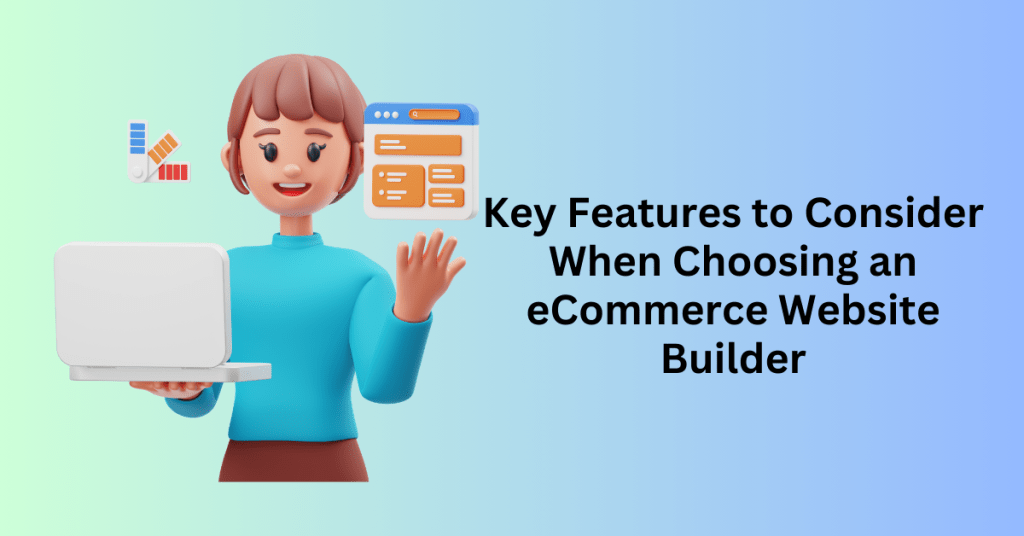
Choosing the right eCommerce website builder is a crucial decision that can significantly impact the success of your online store. The ideal platform should do more than just create a website—it should empower you with tools to build, scale, and manage your business seamlessly. Below, we explore the essential features to look for when selecting the perfect eCommerce platform for your needs.
Customization Options for the eCommerce Website Builder
Your eCommerce website should reflect your unique brand identity. Opt for a platform that offers flexible design tools to customize layouts, fonts, colours, and imagery, ensuring your store aligns perfectly with your brand’s aesthetic. Ease of use is critical; tools like WonderBlocks for the Gutenberg editor enable you to create professional and unique storefronts without requiring coding expertise. Additionally, advanced design options can enhance the user experience by making your website both visually appealing and functional, providing visitors with a seamless shopping experience.
Built-In SEO Features for the eCommerce Website Builder
SEO is essential for driving organic traffic to your online store. A robust eCommerce platform should include SEO plugins, such as Yoast SEO Free and Yoast WooCommerce SEO, to simplify site optimization. Localized and specialized tools like Yoast Local SEO and Video SEO can further enhance your visibility, whether you’re targeting local markets or showcasing digital content. Automating technical SEO aspects ensures better search engine rankings, making optimization more accessible and effective.
Secure Payment Gateway Integration for the eCommerce Website Builder
Building customer trust starts with secure and flexible payment options. Ensure your eCommerce platform supports multiple payment gateways, including popular options like PayPal and Stripe, to accommodate diverse customer preferences. Support for international payments expands your reach, while a seamless checkout process enhances customer satisfaction and encourages repeat business.
Mobile Optimization for the eCommerce Website Builder
With a significant portion of online shopping occurring on mobile devices, a mobile-friendly website is crucial. Features like responsive design ensure your website looks and performs perfectly on smartphones and tablets. Enhanced navigation tools, such as YITH WooCommerce Ajax Search, provide a better mobile user experience by enabling fast and accurate searches. Additionally, mobile optimization boosts SEO, helping you rank higher in search engine results.
Scalability for Future Growth for the eCommerce Website Builder
As your business grows, your eCommerce platform should scale with you. Look for options with advanced plugins, such as YITH Membership, YITH Subscriptions, and YITH WooCommerce Affiliates, to introduce subscription models, memberships, or affiliate programs. The platform should also handle increasing traffic, products, and transactions without compromising performance, ensuring long-term success.
Robust Security Features for the eCommerce Website Builder
Protecting customer data and your business is a top priority. Therefore, it’s crucial to choose a platform that offers SSL certificates for secure data encryption and staging options to test updates and changes without affecting the live site. In addition, a reliable infrastructure plays a vital role in ensuring that your website remains secure from potential threats and downtime. This, in turn, provides both you and your customers with peace of mind, knowing that their information and your business are well-protected.
Advanced eCommerce Tools for the eCommerce Website Builder
To streamline operations and boost sales, your platform should offer essential tools. First, cart recovery tools are crucial for re-engaging customers who abandon their carts, helping to recover potentially lost sales. Additionally, inventory management features are necessary to prevent stock issues and ensure a smooth customer experience. Furthermore, having access to analytics and reporting allows you to make informed business decisions based on real-time data, ultimately enhancing your ability to optimize operations and drive growth.
Support for Diverse Products for the eCommerce Website Builder
Whether you’re selling physical goods or digital downloads, your platform should be equipped to accommodate both. Features that allow for seamless management of both tangible and intangible products make it easier to list, market, and sell. Moreover, versatile tools that cater to different customer preferences ensure that your store can meet a wide range of needs, ultimately enhancing the shopping experience for all customers.
Transparent Pricing and Flexible Plans for the eCommerce Website Builder
Businesses have varying budgets and requirements, so choose a platform with affordable pricing tiers that include essential features like custom domains, SEO tools, and unlimited product listings. Look for platforms that offer free trials, allowing you to test their capabilities before committing, and ensure all costs are transparent with no hidden fees.
Marketing Integrations and Tools for the eCommerce Website Builder
Effective marketing is key to boosting sales. Look for platforms with social media integration to promote products across popular channels, Google Shopping for increased visibility in search results, and built-in email marketing tools to engage customers with promotions and updates.
User-Friendly Interface for the eCommerce Website Builder
Managing your online store should be straightforward and efficient. Platforms with drag-and-drop builders make customization quick and easy, while intuitive dashboards simplify inventory, order, and marketing management, enabling you to focus on growing your business.
Seamless WordPress Integration for the eCommerce Website Builder
If you’re already using WordPress, opt for platforms that integrate seamlessly with it. WooCommerce plugins can transform your WordPress site into a powerful eCommerce store, while streamlined transitions allow you to convert blogs or informational sites into online stores effortlessly.
Explore platforms like Shopify, Wix, Squarespace, Bluehost, BigCommerce, Shift4Shop, and Square Online, each offering tailored solutions to meet your business needs. With the right eCommerce website builder, you can launch a professional online store and grow your business confidently and efficiently.
Benefits of Using an eCommerce Website Builder for Your Store
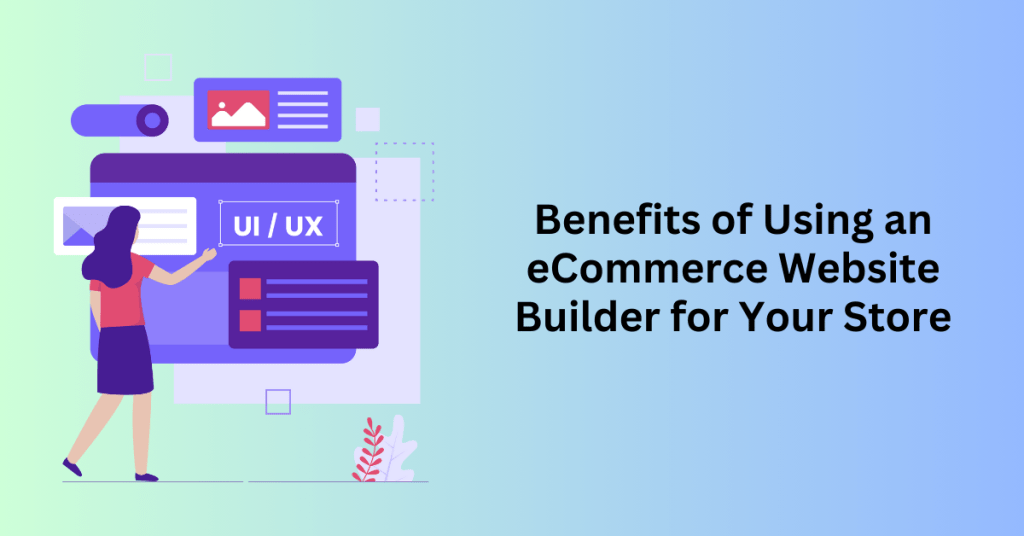
In the fast-paced world of online business, having an efficient and professional eCommerce website is essential. Website builders offer a user-friendly, cost-effective, and comprehensive solution for creating and managing an online store. Let’s explore the key benefits and why they are a game-changer for entrepreneurs and small business owners alike.
Save Time and Effort
Building a website from scratch typically requires technical expertise and a significant time investment. However, website builders simplify this process by offering pre-designed templates, allowing you to choose from a variety of visually appealing, eCommerce-ready designs. Furthermore, with drag-and-drop tools, even users without coding skills can easily arrange and edit elements. The quick setup feature also enables you to launch your store within hours, rather than weeks, freeing up your time to focus on growing your business instead of wrestling with technical challenges.
Cost-Effective Solutions
For small businesses and startups, hiring professional developers can be prohibitively expensive. Website builders offer a budget-friendly alternative with affordable pricing plans, including free or low-cost subscriptions packed with essential features. By eliminating the need for costly design or development services, you reduce overhead. Additionally, in-house management tools allow you to make site updates independently, saving money and giving you full control.
Easy Customization for Brand Identity
Your website should represent your brand, and customization tools make this easy. With website builders, you can add personal touches like your logo, brand colors, and custom fonts. You can also tailor layouts to highlight your products or services effectively. These tools help your business stand out, creating a distinct and memorable online presence that resonates with your target audience.
Comprehensive eCommerce Tools
A powerful website builder includes built-in tools to streamline your operations. Features like inventory management help you track stock levels, while integrated shipping options simplify logistics. Secure payment gateways like Stripe and PayPal ensure smooth transactions, making it easier to manage your eCommerce business.
Built-In SEO Features
To thrive in the competitive eCommerce space, visibility is key. Fortunately, many website builders include built-in SEO optimization tools to help your site rank higher in search results. By offering easy-to-update meta tags and keyword fields, these tools enable you to optimize product pages and blogs for better search performance. As a result, increased visibility translates into higher traffic, allowing more potential customers to discover your store and boosting your chances of success.
Seamless Selling of Physical and Digital Products
Whether you’re selling handcrafted items or downloadable courses, website builders accommodate both. With versatile listings, you can add physical products, digital files, or services with tailored options for each. These platforms also ensure simple transactions, enabling smooth purchases and deliveries. By offering diverse product types, you can appeal to a wider audience and meet varying customer needs.
Integration with Social Media Platforms
Social media plays a vital role in modern marketing, and website builders often provide seamless integrations to leverage its full potential. These features help expand your reach by syncing with platforms like Facebook, Instagram, and Pinterest, allowing you to promote products effectively. Additionally, they enable social selling by allowing customers to link directly to your product pages from social media ads or posts. By regularly updating and promoting through these channels, you can engage your audience more effectively, ultimately fostering stronger customer loyalty and driving sales.
Mobile-Friendly Designs
With most online shopping now occurring on mobile devices, having a responsive website design is crucial. Website builders ensure a seamless user experience across all devices, encouraging customers to browse longer and complete purchases. In addition, mobile-friendly layouts contribute to improved SEO rankings, further boosting your site’s visibility and helping attract more potential customers.
Abandoned Cart Recovery
Abandoned carts are a common challenge in eCommerce, but many website builders offer tools to help address this issue. For instance, automated reminders or discounts for customers who left items in their carts can effectively re-engage shoppers. These features not only encourage customers to return but also help increase conversions by prompting them to complete their purchases, ultimately recovering potentially lost sales.
Scalability for Growth
As your business grows, your website should scale alongside it. Reliable website builders can handle unlimited products, allowing you to expand your inventory without technical headaches. They also offer advanced features, such as plugins for memberships, subscriptions, or affiliate programs, enabling you to explore new revenue streams and support long-term growth.
Advanced Marketing and Analytics Tools
Effective marketing and actionable insights are essential for growth. Website builders often include tools for affiliate programs, such as YITH WooCommerce Affiliates, to encourage others to promote your store. Email marketing features allow you to engage customers with personalized messages, exclusive deals, and product launches. For data-driven decision-making, tools like Ecomdash Reporting and Jetpack CRM provide performance tracking, helping you analyze customer behaviour, monitor sales, and identify trends.
By leveraging the robust features of a website builder, you can create a professional, functional, and scalable eCommerce store that aligns with your business goals. These tools save you time, effort, and money while providing the foundation for long-term success, whether you’re starting out or scaling your operations.
How to Select the Right eCommerce Website Builder
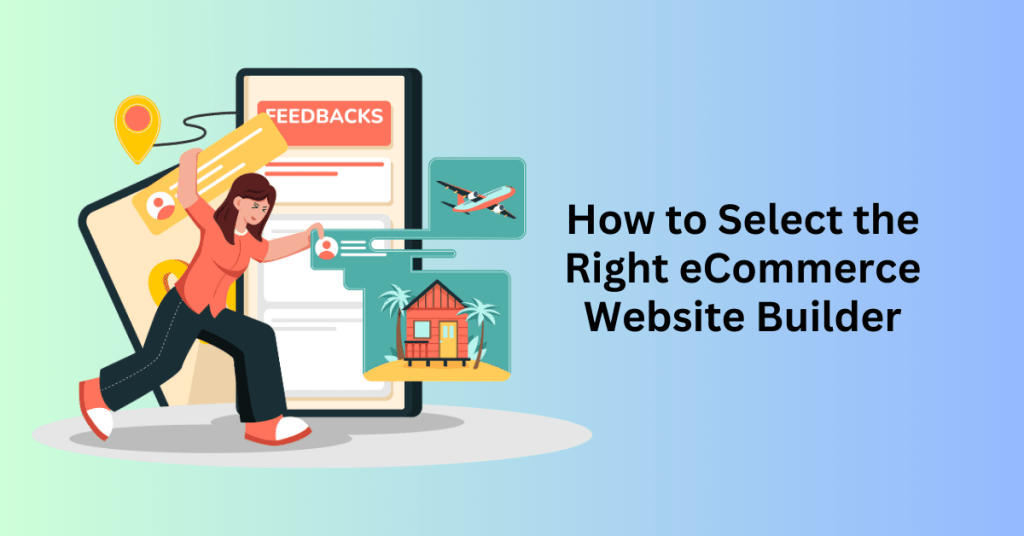
Choosing the ideal eCommerce website builder for your business is a significant decision that can shape the future of your online success. With countless options available, it’s crucial to approach the process with clarity and focus. Whether you’re launching your first online store or upgrading an existing one, the following steps will guide you in selecting a platform that aligns with your needs, supports your growth, and fits your budget.
1. Identify Your Business Requirements
Understanding the unique needs of your business is the foundation for choosing the right eCommerce solution.
Define Your Business Model
Are you selling physical goods, digital downloads, or offering services? Each category comes with its own set of requirements. For instance:
- Physical Products: You’ll need robust inventory management, shipping integration, and product categorization.
- Digital Products: Look for platforms with secure file delivery and download options.
- Services: Ensure the platform supports appointment booking or service packages if applicable.
Pinpoint Essential Features
Create a checklist of must-have features that are crucial for your business operations. Examples include:
- Inventory tracking and management.
- Multiple payment gateway options (e.g., PayPal, Stripe).
- Abandoned cart recovery to boost conversions.
- SEO-friendly tools for higher search engine rankings.
- Customizable checkout processes to enhance the customer experience.
2. Consider Scalability for Long-Term Growth
While you might be starting small, planning for growth is essential. Choose a platform that can scale alongside your business, offering:
- Support for an unlimited number of products.
- Integration capabilities for advanced tools like CRM systems or analytics software.
- The ability to handle surges in website traffic without compromising performance.
3. Prioritize Design and Branding Flexibility
Your website is a direct reflection of your brand identity, so its design should be visually appealing and customizable.
- Templates and Themes: Look for platforms that offer professionally designed templates tailored to eCommerce.
- Customization Options: Ensure the platform allows for tweaking fonts, colors, layouts, and more to align with your brand.
- Advanced Customization: If you require more control, consider platforms like WordPress that allow you to use plugins and custom code for unique functionality.
4. Set a Budget and Compare Costs
Budgeting is a critical aspect when selecting an eCommerce platform. Many builders offer tiered pricing plans, so evaluate the costs carefully.
- Free vs. Paid Plans: Free plans may help you get started, but they often come with limitations such as fewer features or platform branding. Paid plans typically unlock premium functionalities like advanced analytics and priority support.
- Transaction Fees: Some platforms charge a percentage per sale, which can add up as your sales grow.
- Additional Costs: Consider expenses for domain registration, third-party apps, and hosting (if not included).
5. Test the Platform Before Committing
Most eCommerce platforms offer free trials or demos. Use this opportunity to explore their interfaces, features, and ease of use. During the trial, ask yourself:
- Is the dashboard intuitive and user-friendly?
- Can you easily add and organize products?
- How seamless is the checkout process for customers?
6. Evaluate Customer Support and Resources
Reliable support can make a significant difference when technical issues arise. Look for platforms that offer:
- 24/7 customer support via chat, email, or phone.
- Comprehensive knowledge bases, tutorials, and community forums.
Selecting the best eCommerce website builder for your business involves balancing your current needs with your future goals. By thoroughly assessing your requirements, testing platforms, and keeping scalability and costs in mind, you can choose a solution that empowers your online store to thrive. Remember, the right platform is one that grows with you, adapts to your brand, and makes selling online a seamless experience.
Final Thoughts: Create Your Perfect Online Store with the Top eCommerce Website Builder
Choosing the right eCommerce website builder is like finding the perfect pair of shoes—it needs to fit your business needs and align with your unique style. Whether you’re just starting your online sales journey or expanding an established eCommerce business, the right platform is essential to your success.
To simplify your journey, consider the Bluehost WordPress Commerce Solution—a powerful option for building and scaling your online store. With a focus on user-friendly design, robust payment gateway options, and hosting solutions tailored for eCommerce growth, Bluehost offers the tools you need to succeed.
Ultimately, your online store should be a reflection of your vision while providing an effortless shopping experience for your customers. Roll up your sleeves, choose the best tools for the job, and create a store as enticing as a buy-one-get-one-free deal. Here’s to building a platform that turns browsers into buyers and customers into loyal fans.
